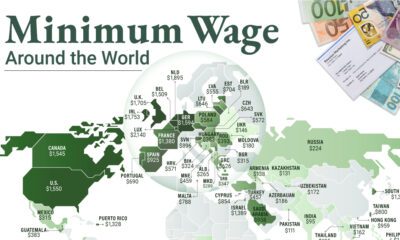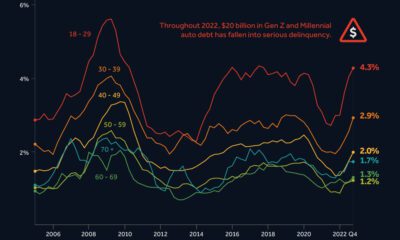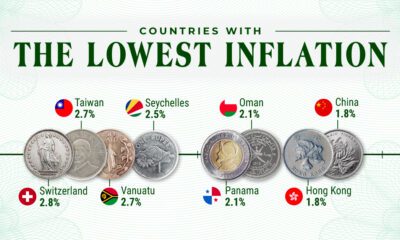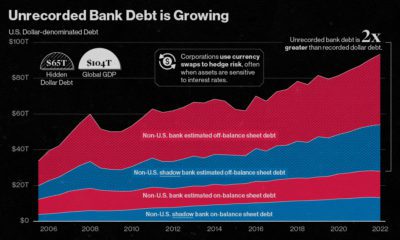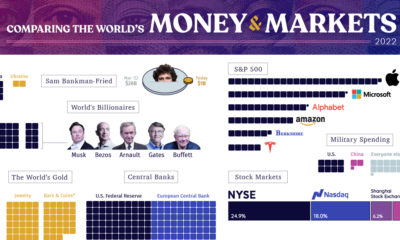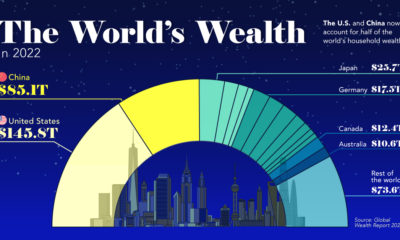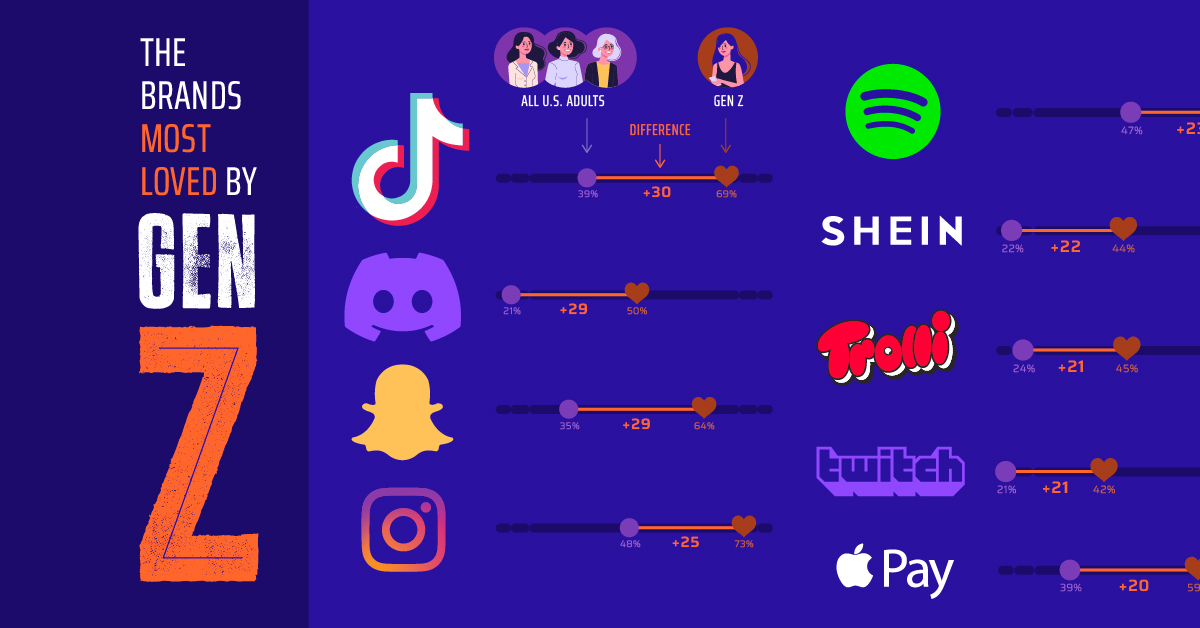Millennials, for example, found the journey to adulthood riddled with obstacles such as stagnating wage growth and uncertain economic conditions. These challenges, combined with other generational circumstances, helped to shape the group’s spending habits and attitudes towards money and debt. Along this journey, Millennials ended up making their fair share of financial mistakes – but interestingly, evidence is now mounting that the next generational cohort (Gen Z) is already learning from their elders.
A New Approach to Money
Today’s infographic comes to us from Rave Reviews and it shows how Gen Z is taking a more pragmatic approach to money.
Gen Z saw some of their older friends take on massive amounts of debt, while also struggling to find well-paying jobs. As a result, this new generation (born 1997 and onwards) is taking a much more pragmatic approach to the world of personal finance. Gen Zers generally want to secure well-paying and stable jobs, and to grow their savings rather than spending money that they don’t have.
School and Work
For Generation Z, an education is often seen as an end to a financial means. In other words, college is an opportunity to build a set of skills that will be valuable to employers, ensuring a stable career. That’s why 88% of the first Gen Z grad class in 2017 ended up choosing their majors with job availability in mind. Recent Gen Z grads are willing to put in the work, as well:
75% are willing to relocate to another state for a job offer 58% are willing to work evenings and weekends 78% have completed an internship or apprenticeship 77% earn extra money through freelance work, a part-time job, or an earned allowance 35% already own their own business, or are planning to start one in the future
While the Gen Z outlook on school and work is a defining factor in their attitude towards personal finance, how they save and spend money is also making a difference.
Saving and Spending
A whopping 89% of Gen Zers say planning for their financial future makes them feel empowered, while 64% have already begun researching the topic of financial planning. With dollars and cents on their minds, Gen Z is a more frugal and fiscally responsible group:
72% say that cost is most important factor when making a purchase 47% use their phones in-store to check prices and ask family or friends for advice 66% plan to attend college in-state to save on tuition
As Gen Z enters the professional workforce and starts investing their savings, it will be interesting to see what comes out of this frugal and practical approach to money.
on This ranking uses consumer preference data from Morning Consult to show which brands are favored considerably more by Gen Z when compared to the general public. A brand’s rank is determined by the difference in favorability between Gen Z’s survey responses and the average of all U.S. adult respondents. Note: Gen Z is the generation born between 1997-2012. Favorability in this ranking is measured using the share of a generation who said they have a “very” or “somewhat” favorable opinion of said brand.
Brands Preferred by Gen Z
Compared to Millennials, Gen X, and Boomers, who may not care as much for these 20 brands, Gen Z—currently between 9-25 years old—loves them. Let’s dive in: Note: Differences may not add up exactly due to rounding. Unsurprisingly, TikTok takes the top spot. The app that is frequently used to poke fun at older generations and that in many ways is a reflection of Gen Z culture, is 30 points more favorable with the young generation than others. Members of Gen Z are the first true “digital natives”—meaning they were raised in the age of digital technology. As a result, many of their favorite brands are either some kind of social media platform and/or digital service, like Apple Pay, Snapchat, or Spotify. In fact, eight of Gen Z’s top 10 favorites on the above list are digital brands. Another distinguishing feature of consumers in this generation is that they’re more likely to care about brand ethics and sustainable consumption than other generations. However, one brand among their top 20 that defies that sentiment is the Chinese clothing company, Shein. This fast fashion company’s model promotes a culture of mass clothing hauls and thus, clothing waste—making it far from environmentally conscious. Shein has also come under fire recently for violating labor laws in its Chinese production facilities. And yet 44% of Gen Zs have a good impression of the brand, and it particularly does well with Gen Z women. Interestingly, members of Gen Z in the U.S. are also the first cohort to have strong awareness of Chinese brands more generally.
Gen Z vs. Millennials
Two generations that are often lumped together, Gen Z and Millennials have some considerable differences when it comes to their favorite brands. Here’s a brief look at some of the brands that do better with Gen Z compared to Millennials specifically, using favorability difference:
TikTok: 14.2 Crocs: 13.4 Pixar: 8.1 Morphe: 6.1
Compared to their generational neighbors, one interesting standout is Crocs—the utilitarian, but highly-customizable foam clogs—which almost 60% of Gen Zs see as favorable compared to only 46% of Millennials.
Gen Z’s Favorite Brands Overall
While Gen Z differentiates itself from the older generations in many ways, a lot of the overall favorites still align with everyone else’s.
Gen Z Trends
Overall, the report found that it’s hard for brands to win with Gen Z. Across all brands that were scored, 33% of the general American public rated them as favorable, but for Gen Z respondents the number dropped to 27%. In general, Gen Z tends to value conscious consumption and subsequently, brands that can meet those expectations. Digital services and products also do well with this generation that has never known a world without internet. As more and more Gen Zers enter the labor market and grow their consumer power, they will be an important generation to watch.

